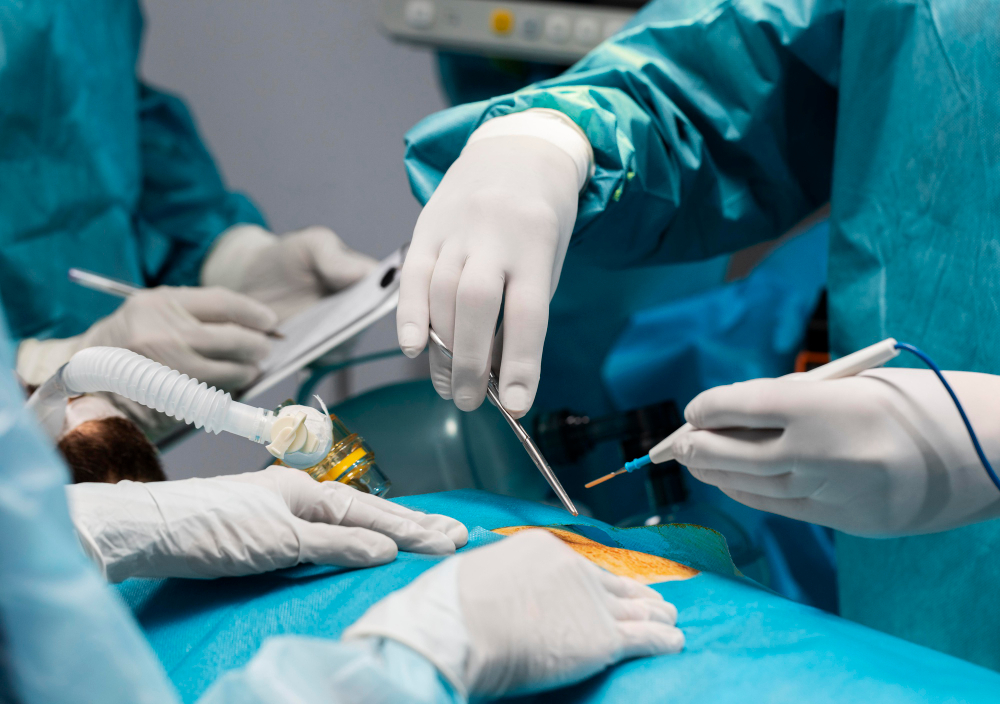Why is Laparoscopic Surgery Done?
Category: General Surgery
Laparoscopic surgery is a minimally invasive surgical technique that uses small incisions and a camera-guided approach to perform procedures with precision. Compared to traditional open surgery, it offers faster recovery, minimal scarring, and reduced risk of complications. Laparoscopic procedures are widely used for conditions affecting the abdomen, reproductive organs, and digestive system.
At Lokmanya Hospital, patients benefit from comprehensive care in both general and laparoscopic surgery. The hospital provides advanced procedures such as laparoscopic gallbladder surgery, appendix laparoscopic surgery, ovarian cyst laparoscopic surgery, and fibroids laparoscopic surgery, ensuring safe treatment with modern technology and expert surgeons.
What is Laparoscopic Surgery?
Laparoscopic surgery is a minimally invasive technique where the surgeon makes small incisions and uses a camera and specialized instruments to perform the procedure. This approach allows precise treatment with minimal tissue damage, less post-operative pain, and a shorter hospital stay. It is commonly used for procedures such as hysterectomy, treatment of PCOS, and various uterus-related surgeries.
Why Laparoscopic Surgery is Done
Laparoscopic surgery is preferred for various medical reasons, from diagnosis to treatment of complex conditions.
- Minimally Invasive Treatment: The small incisions reduce trauma to surrounding tissues and lower the risk of infection.
- Faster Recovery: Patients experience shorter laparoscopic surgery recovery time, allowing them to resume normal activities sooner.
- Diagnostic Purposes: Laparoscopy helps in identifying abdominal or pelvic conditions, such as ovarian cysts, fibroids, or uterine abnormalities.
- Treatment of Common Conditions: Includes laparoscopic gallbladder surgery, appendix removal, hernia repair, and management of PCOS or fibroids.
- Cosmetic Advantages: Minimal scarring is particularly beneficial for reproductive and abdominal surgeries, making it a preferred option for women undergoing procedures like laparoscopic hysterectomy surgery.
Types of Laparoscopic Surgery
Laparoscopic techniques are applied across various medical fields to treat specific conditions effectively.
- Appendix Laparoscopic Surgery: Removes inflamed appendices with minimal recovery time.
- Ovarian Cyst Laparoscopic Surgery: Excises cysts while preserving ovarian function.
- Fibroids Laparoscopic Surgery: Removes uterine fibroids with minimal incision and faster healing.
- Laparoscopic Surgery for PCOS: Helps treat cysts and related reproductive issues.
- Laparoscopic Surgery for Uterus & Hysterectomy: Treats uterine abnormalities and removes the uterus when necessary.
- Laparoscopic Gallbladder Surgery: Removes gallstones with smaller incisions, reducing pain and hospital stay.
Advantages of Laparoscopic Surgery
The benefits of laparoscopic surgery make it an attractive alternative to traditional open procedures.
- Less post-operative pain and reduced risk of infection.
- Minimal scarring and better cosmetic results.
- Shorter hospital stay and faster laparoscopic surgery recovery time.
- Suitable for both diagnostic and therapeutic purposes.
- Enables treatment of multiple conditions in a single session.
Why Choose Lokmanya Hospital for Laparoscopic Surgery
At Lokmanya Hospital, patients receive expert care in laparoscopic surgery in Pune for conditions like gallbladder stones, ovarian cysts, fibroids, and appendix removal. The hospital is equipped with advanced laparoscopic tools and imaging technology, ensuring accurate diagnosis and safe procedures.
Post-operative care is tailored for each patient, focusing on pain management, diet guidance, and monitoring laparoscopic surgery recovery time. With experience in general and laparoscopic surgery, Lokmanya Hospital provides a patient-centered approach for effective treatment and fast recovery.
Conclusion
Laparoscopic surgery is a safe, minimally invasive solution for a wide range of abdominal, reproductive, and digestive conditions. Its benefits include faster recovery, less pain, minimal scarring, and accurate treatment outcomes. At Lokmanya Hospital, expert surgeons, modern facilities, and comprehensive post-operative care make it a trusted choice for patients seeking laparoscopic surgery in Pune.
FAQs
1.What is laparoscopic surgery?
Laparoscopic surgery is a minimally invasive procedure using small incisions and a camera to perform surgeries with precision.
2. What is appendix laparoscopic surgery?
A minimally invasive procedure to remove the inflamed appendix, allowing faster recovery and less pain than open surgery.
3. What is ovarian cyst laparoscopic surgery?
This procedure removes ovarian cysts while preserving healthy ovarian tissue, ensuring minimal scarring and quicker recovery.
4. What is laparoscopic hysterectomy surgery?
A minimally invasive surgery to remove the uterus, often used to treat fibroids, heavy bleeding, or uterine abnormalities.
5. What is fibroids laparoscopic surgery?
A procedure to remove uterine fibroids through small incisions, reducing recovery time and post-operative discomfort.
6. What is laparoscopic surgery for PCOS?
It treats ovarian cysts associated with PCOS and may improve fertility outcomes in selected patients.
7. What is laparoscopic gallbladder surgery?
A minimally invasive procedure to remove the gallbladder or gallstones, allowing faster laparoscopic surgery recovery time.
8. What is the laparoscopic surgery cost in Pune?
Costs vary depending on the procedure, but hospitals like Lokmanya provide transparent pricing and personalized treatment plans.
9. What is laparoscopic hernia surgery cost?
Costs depend on the type and complexity of the hernia, hospital, and surgeon expertise. Lokmanya Hospital offers affordable packages for laparoscopic hernia repair.
Previous blog

How to Get Relief from Back Pain?
Next blog






